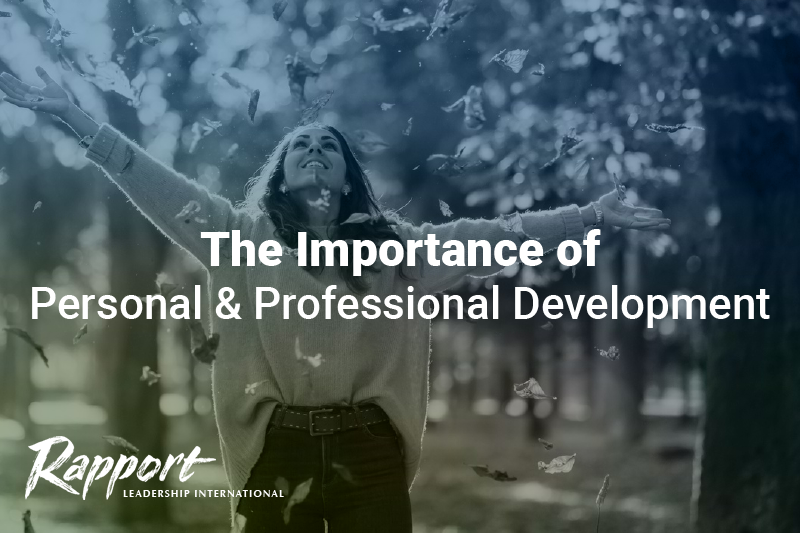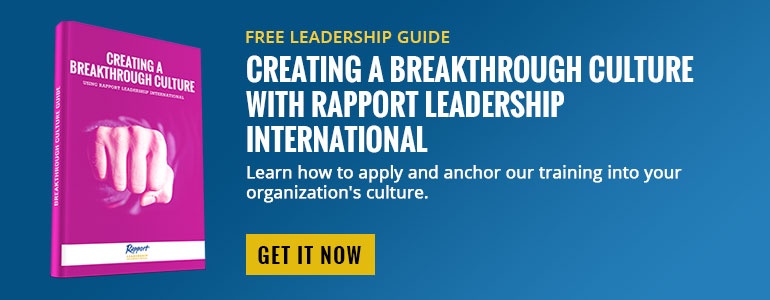Why Is Personal and Professional Development Important?

As a leader, you are an example to your team inside and outside of the office. High expectations will be set for you, your actions will be scrutinized, and often, your employees will look to you for how to react or behave in a situation.
You may choose to see this as a burden. After all, you are responsible to yourself and to the people underneath you. Or you may see this responsibility as an opportunity to affect change in your business and in the lives of your employees. Hopefully, you embrace this gift and choose to serve your employees by being the best possible person you can be.
Why Is Personal and Professional Development Important?
Just like everything in this world, reaching your greatest potential takes hard work and dedication. You may have the best of intentions in every situation; do you have the best of training?
Check out our leadership development training →
Some people are considered "born leaders." They are outgoing, charismatic, passionate, and kind. If you're one of these people, that's fantastic! However, there's still an opportunity to hone your skills and learn new ones that will serve you well in your leadership roles.
If you don't consider yourself a born leader, don't fret. If the desire is there, all of the necessary leadership skills can be taught.
Why Is Ongoing Professional Development Important?
Whether you work in an industry that requires Continuing Education credits or not, ongoing professional development will keep you at the top of your game. There are a number of benefits to constantly seeking development opportunities including:
Learning New Skills to Use in Your Current Role or to Advance in Your Career
No matter how long you've worked in a position, a company, or an industry, you will frequently face new challenges. The marketplace, the employees you're tasked with leading, and the customers you'll interact with are changing. Ongoing professional development can help you deal with whatever comes your way.
Learning new skills allows you to move up into different roles within your company and be more attractive to new organizations that you may wish to work for.
Building Credibility and Confidence
As the marketplace changes, leaders are expected to keep up with the times or risk becoming extinct. This may include certification programs, skills training, embracing technology, learning to communicate better, or any number of professional development topics. As you learn more, your confidence and your credibility will grow.
Standing as an Example for Your Employees
You probably expect your employees to undergo some form of professional development training during their careers, so shouldn't you? Show your team that you are willing to put in the work to become a better leader for them. They will not only appreciate your desire to serve them well but will also be motivated to embark on their own professional development journey.
Related: How to Develop Leadership Skills in Yourself and Others
Why Is Long-Term Personal Development Important?
Let's be honest—there is not a single individual, no matter how "professional" they claim to be, that leaves their personal relationships or their personality at the door to the office. On the contrary, being who we are contributes to our ability to connect with our teams, customers, vendors, etc.
Knowing that we must bring our "selves" to work every day, we must now focus on how to be the best individuals we can possibly be.
What Are Some Examples of Good Personal and Professional Development Goals?
In order to fully embrace the benefits of personal and professional development, we must first set goals for ourselves. What do you hope to get out of your development activities, and how will you go about reaching those goals?
The most important thing to keep in mind is that all goals must be SMART:
- Specific
- Measurable
- Achievable
- Relevant
- Timely
Clearly identify the action and when it will be completed by. This prevents the frustration of open-ended goals like "Become a better leader," which will never be clear as to how or when it's been achieved.
Professional Development Goals
There are a variety of goals that you can create for yourself in a professional setting. Some of these include:
- Completing two leadership development courses this year
- Hiring a coach to improve presentation skills
- Spending 1 hour each week speaking with employees about potential areas for improvement
- Attending the training for the new computer software before it's implemented
Personal Development Goals
Consummate professionals may not talk about their personal goals at work. Nonetheless, personal life can affect our attitudes, how we interact with others, and how fulfilled we feel in our lives and the roles within them. Now that we've addressed how to be an effective leader in the office, how do you create positive change in your personal life? You can apply the same ideas to your personal development goals. Here are a few examples to get you thinking:
- Read 10 books this year
- Leave work by 6 pm every night to make family dinner
- Spend weekends with family or friends instead of catching up on work
- Work out at the gym 3 times per week
- Save $1,000 each month and put into Emergency Fund account
Creating a Personal and Professional Development Plan
The most successful personal and professional development is done in a systematic and intentional manner. In order to create a plan for yourself (or for your employees), you must follow these steps:
- Figure out where you are now. Sometimes, we like to ignore the reality of the situation as it is and skip over to a future vision. However, in order to get where we want to go, we have to know where we are starting from. Assess each area of your life and professional career to identify the baseline from which you'll be starting.
- Identify your goals. Now is the time to figure out what you'd like for your future and then construct SMART goals to represent this vision.
- Research. What requirements, education, skills, experience, etc. are necessary to achieve your goals?
- Evaluate your skills. You may already have some of the skills or requirements to get where you want to go. If so, make a list of the skills you already possess and the ones you need to work on.
- Choose a route. How will you add these skills to your inventory? Will you take online courses, attend retreats, sign up for workshops, hire a coach, etc.?
- Decide on your timeline. By what date would you like to have your ultimate goal reached? Work backward and figure out when each step must be completed by in order to reach that goal.
- Put it on paper. Nothing makes a decision more real than committing it to paper. Write out what you plan to do and then find a friend or colleague that can hold you accountable.
- Check in throughout the process. Life often gets in the way of our plans. Fires must be put out, emergencies arise, and days (then weeks and months) get away from us. Check in on a weekly or monthly basis to see where you are with your plan and make any necessary adjustments.
Personal and professional development will make every aspect of your life easier to handle. Your employees will appreciate your effort as will your family, friends, and most importantly... you.



